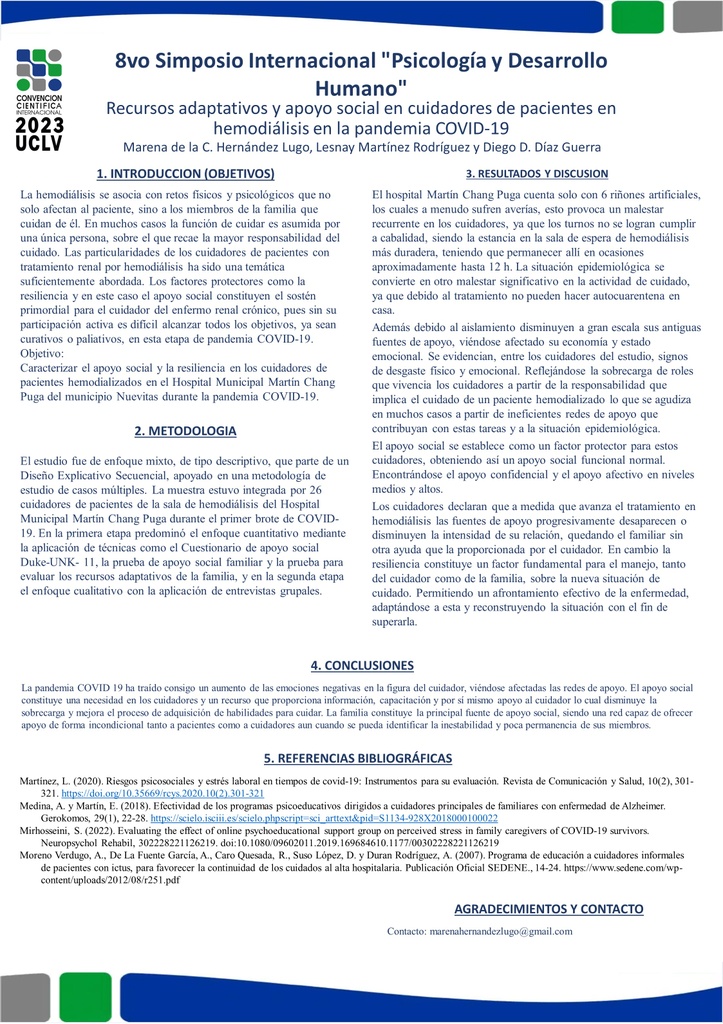Executive Secretary

VIII Simposio Internacional "Psicología y Desarrollo Humano" 2023

La hemodiálisis se asocia con retos físicos y psicológicos que no solo afectan al paciente, sino a los miembros de la familia que cuidan de él. Los factores protectores como la resiliencia y en este caso el apoyo social constituye el sostén primordial para el cuidador del enfermo renal crónico en la pandemia COVID-19. El objetivo de esta investigación fue caracterizar el apoyo social y la resiliencia en los cuidadores de pacientes hemodializados en el Hospital Municipal de Nuevitas durante la COVID-19. El estudio fue cuantitativo, transversal, de tipo descriptivo. La muestra fue de 26 cuidadores de pacientes de la sala de hemodiálisis durante el primer brote de COVID-19. Se aplicó el cuestionario de apoyo social Duke-UNK- 11, la prueba de apoyo social familiar y la prueba para evaluar los recursos adaptativos de la familia. El hospital cuenta solo con 6 riñones artificiales, los cuales a menudo sufren averías, esto provoca un malestar recurrente en los cuidadores. La situación epidemiológica constituye otro malestar en la actividad de cuidado, ya que debido al tratamiento no pueden hacer cuarentena. Se evidencian, entre los cuidadores del estudio, signos de desgaste físico y emocional. Los cuidadores declaran que a medida que avanza el tratamiento en hemodiálisis las fuentes de apoyo progresivamente desaparecen o disminuyen la intensidad de su relación, quedando el familiar sin otra ayuda que la proporcionada por el cuidador. La resiliencia constituye un factor fundamental para el manejo, tanto del cuidador como de la familia, sobre la nueva situación de cuidado.
Hemodialysis is associated with physical and psychological challenges that not only affect the patient, but also the family members who care for the patient. Protective factors such as resilience and in this case social support constitute the primary support for the caregiver of the chronic kidney patient in the COVID-19 pandemic. The objective of this research was to characterize social support and resilience in the caregivers of hemodialyzed patients in the Municipal Hospital of Nuevitas during COVID-19. The study was a quantitative, cross-sectional, descriptive study. The sample consisted of 26 caregivers of patients in the hemodialysis ward during the first outbreak of COVID-19. The Duke-UNK- 11 social support questionnaire, the family social support test and the test to assess family adaptive resources were applied. The hospital has only 6 artificial kidneys, which often break down, causing recurrent discomfort to caregivers. The epidemiological situation constitutes another discomfort in the caregiving activity, since due to the treatment they are unable to quarantine. Signs of physical and emotional exhaustion are evident among the caregivers in the study. The caregivers state that as hemodialysis treatment progresses, the sources of support progressively disappear or the intensity of their relationship diminishes, leaving the family member with no help other than that provided by the caregiver. Resilience constitutes a fundamental factor for the caregiver's and the family's management of the new caregiving situation.
Sobre el ponente

Marena de la C. Hernández Lugo

Discussion